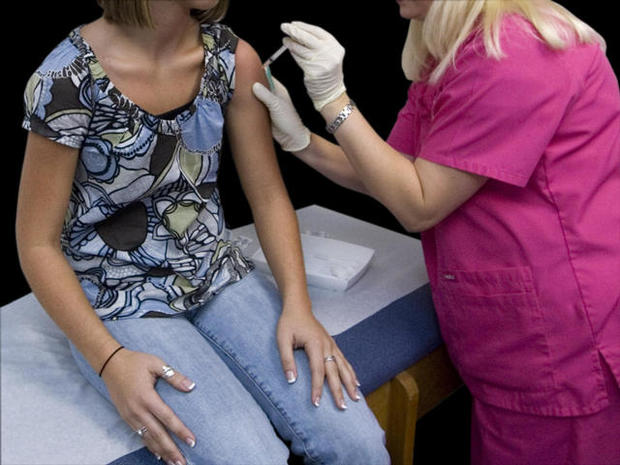Controversial HPV vaccine even protects unvaccinated women, study suggests
(CBS News) A new study shows that the human papillomavirus (HPV) vaccine is so effective at reducing the number of infections young women are getting, it's even protecting people who haven't gotten vaccinated.
The protective effect is called "herd immunity," a concept that suggests when a critical portion of a community is immunized against a contagious disease, the rest of the community becomes protected because there's less chance for an outbreak.
For the new research, doctors at Cincinnati Children's Hospital Medical Center looked at 368 unvaccinated young women ages 13 to 16 from two local primary care clinics who had sexual contact and were recruited from 2006 to 2007. The researchers compared those rates to a different group of 409 young women recruited between 2009 and 2010, more than half of whom got at least one dose of the HPV vaccine. Girls in the study who were vaccinated were given the Gardasil vaccine, which protects against four strains of HPV.
The researchers found a 58 percent decrease in the prevalence of vaccine-targeting HPV strains, from 31 percent of young women to 13.4 percent. That amounted to a 69 percent decrease among vaccinated patients and a 49 percent decrease for unvaccinated young women. The findings were published July 9 in Pediatrics.
"Infection with the types of HPV targeted by the vaccine decreased in vaccinated young women by 69 percent," study author Dr. Jessica Kahn, a physician in the division of Adolescent Medicine at Cincinnati Children's Hospital, said in a press release. "Two of these HPV types, HPV-16 and HPV-18, cause about 70 percent of cervical cancer. Thus, the results are promising in that they suggest that vaccine introduction could substantially reduce rates of cervical cancer in this community in the future."
Kahn said the decrease among vaccinated young women was "especially remarkable" because many were sexually experienced and exposed to HPV before vaccination, and many only underwent one dose of the vaccine when three are recommended for the most protection.
Critics of the HPV vaccine have argued against states that require preteen girls to get the shot, including arguments from some claiming that vaccinating young girls may promote promiscuity. Other critics call such a requirement a violation of civil liberties, such as when Rep. Michele Bachmann targeted Governor Rick Perry's controversial 2007 executive order in Texas during a presidential debate last year. The Texas Legislature eventually passed a bill to block the order.
Another common complaint against the vaccine points to oft-debunked links that tie vaccines to causing development disabilities such as autism.
Dr. William Schaffner, chairman of the department of preventive medicine at Vanderbilt University told MyHealthNewsDaily that the study is "good news that comes surprisingly soon."
"It's impressive if other studies can confirm it," Schaffner said, adding research would also neeed to be done on a larger population - including boys - to show herd immunity. "Vaccination is not just about the individuals getting vaccinated...it's about everyone else in the community."
Disease protection for people who can't get vaccinated is one reason why doctors heavily urge parents to get their child immunized despite parents' vaccine fears over autism links.
Kahn however noted that while rates of HPV strains the vaccine targets decreased, the overall prevalence of HPV was "extremely high," she said, with about one in four unvaccinated study participants already positive for one high-risk type of the disease.
Besides Gardasil, which also protects against two strains of HPV that cause most genital warts, Cervarix is also approved to protect against the two HPV strains tied to cancer risk. Out of the two vaccines, only Gardasil is approved for boys (up until age 21) as well.
HPV is the main cause of cervical cancer in women. Each year there are about 12,200 new cervical cancer cases in the United States and more than 4,200 deaths in women each year. There are about 15000 HPV-associated cancers in the U.S. that may be prevented by vaccines each year in women, including cervical, anal, vaginal, mouth cancers.
About 1 in 100 sexually active adults in the U.S. have genital warts at any given time.
The CDC has more on HPV vaccines.

